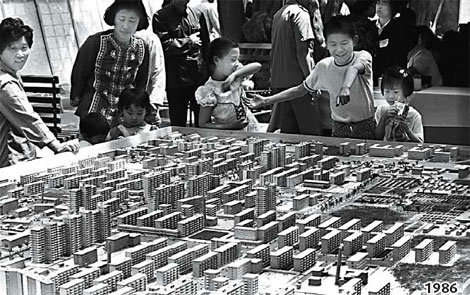|
|
 |
|
30th Anniversary Celebrations
New Rural Reform Efforts
Political System Reform
Changing Lifestyle
In Foreigners' Eyes
Commentary
Enterprise Stories
Newsmakers
Photo Gallery
Video and Audio
Wang Wenlan Gallery
Slideshow
Key Meetings
Key Reform Theories
Development Blueprint
Liu Shinan:
Don't go too far in name of sex education Hong Liang:
US should fix its own economic woes first Chen Weihua:
Need for medical privacy OP Rana:
This world dream can't be deferred Home sweet home
By You Nuo (China Daily)
Updated: 2008-10-28 09:34
   Not many industries can be as both important and hard to manage as housing, as many economic watchers have begun to realize. Much of a society's consumer spending is tied to the pattern of its housing/real estate market directly and indirectly. It was no accident, in retrospect, that China's successful rural reform was immediately followed by the change in village housing conditions, and that the boom in the urban economy from the 1990s was accompanied by the privatization of housing and widespread new building projects in the cities. Our black-and-white photo catches a scene in the early days of China's urban housing market when private home ownership plans had yet to be introduced and people could only exchange existing housing units on the marketplace. Some new housing projects, resembling enlarged matchboxes, with simple interior fixtures, were also put on show at those house-swapping fairs. Their design - or lack of design - reminded people of the days of drab uniformity that had just passed. In a sharp contrast today a casual tour of Chinese cities can reveal a much larger variety of designs. Our color photo shows how a new generation of young architects, some who graduated from Western schools and at times joined by master architects from abroad, are creating new cities from their drawing boards. Admittedly, not all new home developers are admired. Land developers and construction contractors are frequently condemned for their greed and disregard for safety rules and environmental quality. But just as the world cannot afford to shut down the financial business due to the greed and self-destructive scams on Wall Street, the housing/real estate sector cannot be shut down as a result of its failures. Instead, the entire industry should be put under better management. This is why a number of municipal governments have recently rolled out policies to boost the housing market - following the guidance of central government agencies - after a relatively long housing market cool down. The new policies are designed to boost real estate sales in the hope that domestic consumer spending will take up the slack when overseas sales for Chinese products are at low ebb. Putting it simply, these are policies to lead the Chinese to buy more when the foreigners are buying less. Officials understand that nothing can generate more sales for industries both on the upper and lower streams than selling more homes. Many industries, from steel and concrete to home improvement materials and appliances, are all waiting for the renewed demand. But all the incentives are more carefully tailored to favor small home owners than the ones that were available in the 1990s and early 2000s. Those failed to differentiate between large and small home owners and led to the developers almost mindlessly building enormous, expensive projects. Hence the move by the Ministry of Finance to lower the downpayment requirement from 30 percent to 20 percent for first-time home owners. In Shanghai, where incentives are more comprehensive, quite a few across the board tax cuts were provided for small and first-time home owners.
 
 |
主站蜘蛛池模板: 国内高清久久久久久久久 | 毛片国产 | 日韩一区二区在线免费观看 | 免费观看欧美一级特黄 | 午夜一级片| 国内91视频| 亚洲综合久久综合激情久久 | 美国一级大黄香蕉片 | 久久精品国产只有精品6 | 国产中文99视频在线观看 | 99久久国产免费福利 | 高清色黄毛片一级毛片 | 欧美一级毛片免费播放aa | 精品一区二区三区的国产在线观看 | 男人和女人在床做黄的网站 | 免费观看欧美一级牲片一 | 美国美女一级毛片免费全 | 国产盗摄一区二区 | 一区二区三区在线免费观看视频 | 国产综合精品久久亚洲 | 国产一区二区三区四区波多野结衣 | 99小视频 | 国产欧美日韩综合精品一区二区三区 | 欧毛片| 国产精品李雅在线观看 | 国产精品日本欧美一区二区 | 视频一区免费 | 宫女淫春| 欧美性色xo影院在线观看 | 亚洲国产精品综合久久一线 | 久久久久久91香蕉国产 | 欧美日比视频 | 久草在线网址 | 久久久久久免费播放一级毛片 | 99久久伊人一区二区yy5099 | 中文字幕 日韩在线 | 亚洲国产一区在线 | 久久久久久久国产精品视频 | 亚洲视频在线免费播放 | 欧美日韩一区二区三区四区在线观看 | 欧美日本国产 |